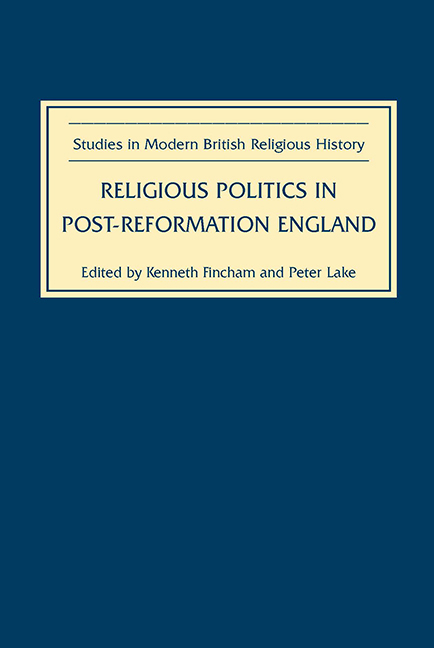Book contents
- Frontmatter
- CONTENTS
- Dedicaton
- Miscellaneous Frontmatter
- Preface
- Abbreviations
- 1 Introduction: Puritanism, Arminianism and Nicholas Tyacke
- 2 Art and Iconoclasm in Early Modern England
- 3 The Latitude of the Church of England
- 4 Joan of Contention: The Myth of the Female Pope in Early Modern England
- 5 Anti-Puritanism: The Structure of a Prejudice
- 6 The Fortunes of English Puritanism: An Elizabethan Perspective
- 7 What's in a Name? Dudley Fenner and the Peculiarities of Puritan Nomenclature
- 8 Puritan Preachers and their Patrons
- 9 New England's Reformation: ‘Wee shall be as a Citty upon a Hill, the Eies of All People are upon Us’
- 10 ‘Anglicanism’ by Stealth: The Career and Influence of John Overall
- 11 Destroyed for doing my Duty: Thomas Felton and the Penal Laws under Elizabeth and James I
- 12 Charles I and Providence
- 13 John Shawe and Edward Bowles: Civic Preachers at Peace and War
- 14 Material Evidence: The Religious Legacy of the Interregnum at St George Tombland, Norwich
- Index
- Tabula Gratulatoria
- Studies in Modern British Religious History
11 - Destroyed for doing my Duty: Thomas Felton and the Penal Laws under Elizabeth and James I
Published online by Cambridge University Press: 25 October 2017
- Frontmatter
- CONTENTS
- Dedicaton
- Miscellaneous Frontmatter
- Preface
- Abbreviations
- 1 Introduction: Puritanism, Arminianism and Nicholas Tyacke
- 2 Art and Iconoclasm in Early Modern England
- 3 The Latitude of the Church of England
- 4 Joan of Contention: The Myth of the Female Pope in Early Modern England
- 5 Anti-Puritanism: The Structure of a Prejudice
- 6 The Fortunes of English Puritanism: An Elizabethan Perspective
- 7 What's in a Name? Dudley Fenner and the Peculiarities of Puritan Nomenclature
- 8 Puritan Preachers and their Patrons
- 9 New England's Reformation: ‘Wee shall be as a Citty upon a Hill, the Eies of All People are upon Us’
- 10 ‘Anglicanism’ by Stealth: The Career and Influence of John Overall
- 11 Destroyed for doing my Duty: Thomas Felton and the Penal Laws under Elizabeth and James I
- 12 Charles I and Providence
- 13 John Shawe and Edward Bowles: Civic Preachers at Peace and War
- 14 Material Evidence: The Religious Legacy of the Interregnum at St George Tombland, Norwich
- Index
- Tabula Gratulatoria
- Studies in Modern British Religious History
Summary
After John Felton stabbed the duke of Buckingham in 1628, contemporaries scrambled to identify the assassin. East Anglian residents immediately recalled the Feltons as ‘a very ancient family of gentry in Suffolk, very valorous and of a stout spirit’. Beyond that, however, information about John Felton trickled in from unusual sources. Catholics, it turned out, were well acquainted with John's father, and over a decade after his death, they still shuddered at the mention of his name. Many exchequer officials also knew John and his family, although they were hesitant to admit they were on a first-name basis with them. Equally knowledgeable, and equally reticent, was Charles I. Not only did he know John Felton, albeit distantly, but he and his father had paid the assassin's mother a pension; indeed so strong was Mrs Felton's grip on the royal bounty that even after the duke's assassination, the king continued to honour his financial obligation to her.
Such a disparate array of contacts is, to say the least, surprising; it is also almost wholly absent from the sparse secondary literature on John Felton. This essay seeks to correct this omission, and in the process it will argue that the career of the assassin's father provides not only the deeper background to Buckingham's murder, but also it unexpectedly illuminates the murky administrative workings of ‘practical anti-papistry’. Generations of ecclesiastical scholars have carefully analysed the major strands of protestant theology and practice, into which we are belatedly incorporating the comparable developments among English Catholics. Yet in sharp contrast, our knowledge of the actual enforcement of the penal laws is sketchy. While Catholic scholars have admirably described how recusants coped, almost no one has attempted similar research from the state's perspective. Consequently we are only dimly aware of the personnel, practices and periodic fluctuations in the implementation of anti-Catholic legislation, arguably the early modern state's most sustained attempt to modify individual behaviour. To understand precisely what we have missed, we have only to follow John Felton's father through Whitehall.
In the late sixteenth century, those who clung to the old faith found their position increasingly precarious as a creeping barrage of statutes steadily boxed them in, restricting their movements, blocking their education and, if they failed to pay a monthly fine of £20, seizing two-thirds of their property.
- Type
- Chapter
- Information
- Religious Politics in Post-Reformation England , pp. 177 - 192Publisher: Boydell & BrewerPrint publication year: 2006



